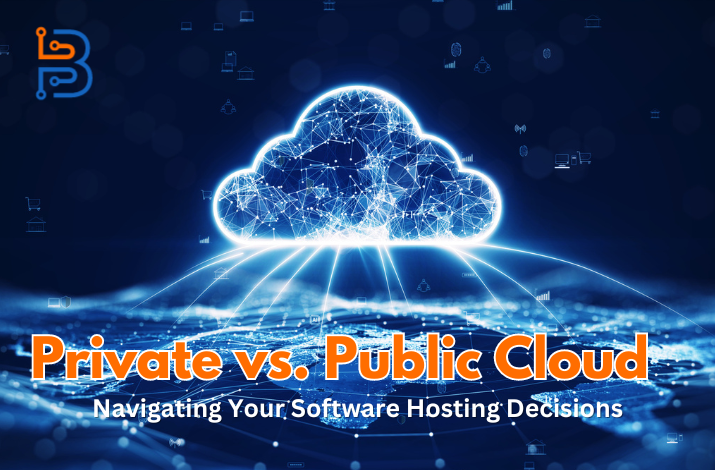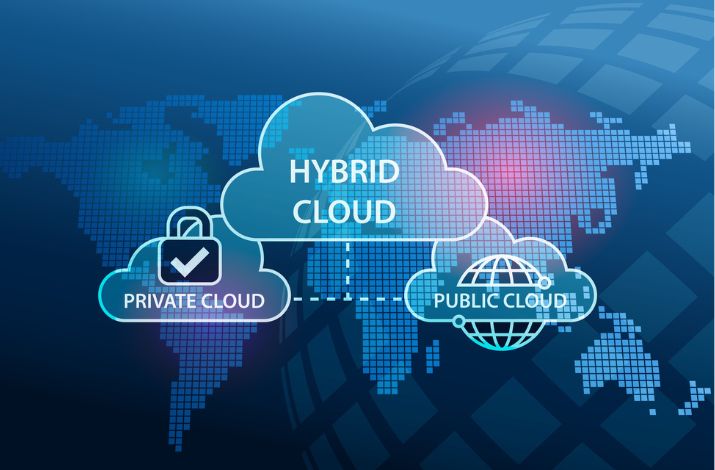Private vs. Public Cloud: Navigating Your Software Hosting Decisions

The method that enterprises take to software hosting has been completely changed by cloud computing. Because of their affordability, scalability, and flexibility, cloud solutions are becoming a more appealing option than conventional on-premises data centres.
But as the cloud industry develops, companies must make the vital decision between private and public clouds. Organisations must carefully assess their alternatives because each model has unique benefits and considerations.
Making an informed decision requires knowing the key distinctions between private and public clouds. An examination of the features of each cloud deployment model is conducted in this article.
Public vs. Private Cloud Comparison
Cloud computing services allocated solely to a particular organisation are referred to as private clouds. The infrastructure can be housed in the company’s own data centre or it can be obtained from a third party that offers cloud-based infrastructure and software hosting.
In contrast, a public cloud offers computing resources, such as servers and storage, owned and operated by a cloud service provider. Multiple customers share these resources via the Internet. The fundamental distinction between private and public clouds lies in the ownership and resource access.
In a private cloud, an organization owns the hardware and software infrastructure. If they get services from a cloud provider, they also get enterprise hosting solutions, including managing your guidance and all your cloud resources. This translates to greater control over configurations and security. With a public cloud, the organization rents resources from a pool shared with other customers, leading to a pay-as-you-go pricing model and less direct control over the underlying infrastructure.

Differences Between Private And Public Cloud
Several key differences between private and public cloud infrastructure can guide you in determining the best option. They include the following:
Access Control and Security
Private clouds reign supreme in the realm of access control and security. Organizations maintain absolute authority over who can access their data and how it’s secured. They can implement stringent security protocols aligned with their needs or industry regulations. Since data resides within the organization’s infrastructure (whether on-premises or hosted), there’s a heightened sense of privacy and control.
While not inherently less secure, public clouds rely on security measures implemented by the cloud provider. These providers invest heavily in robust security, but some organizations may have unique compliance requirements better fulfilled by the complete control available in a private cloud. Public clouds provide standardized protection, which can significantly benefit businesses without highly specialized security needs.
Customization and Flexibility
Private clouds offer unparalleled customization for organizations seeking to tailor their cloud environment precisely to their needs. Every aspect of the infrastructure, from hardware to software configurations and network protocols, can be adjusted. This allows businesses to support specialized applications or workflows that might have strict requirements or unusual configurations.
With public clouds, customization options are limited. While providers offer a range of services and configurations, organizations must work within the constraints of those offerings. Implementing highly customized solutions might be challenging or even impossible in a public cloud environment.
Scalability and Resource Management
Public clouds shine when it comes to scalability. They allow organizations to rapidly increase or decrease resources on demand, ensuring they can match capacity to workload without overprovisioning. This “pay-for-what-you-need” model particularly appeals to businesses with fluctuating resource requirements.
Private clouds present a different dynamic. The organization’s existing hardware capacity often limits scalability. Expanding to accommodate a surge in demand might require significant hardware investments and time. Conversely, careful capacity planning within a private cloud can lead to more predictable long-term costs.
Read Also: Ways Managed Security Services Secure Your Business from Cyber Attacks
Cost Considerations
The initial outlay for private clouds is usually more because of the cost of acquiring and configuring the required hardware and software. In addition, there are continuous costs for staffing, management, and maintenance. A private cloud, however, can provide more predictable long-term costs with careful planning—especially for companies with steady workloads.
The public cloud’s appeal lies in its pay-as-you-go pricing model. Large upfront investments are not necessary because organisations just pay for the resources they use. Businesses with varying workloads or those wishing to experiment quickly without making a large capital expenditure will find this model particularly appealing. But public cloud costs can rise quickly as consumption does, and they might eventually exceed private cloud costs over time.
A Private Cloud Infrastructure’s Advantages
In light of the intricacies of contemporary IT, private clouds present a strong substitute for public cloud offerings for enterprises. Organisations with specific requirements or stringent regulations find private clouds especially appealing due to their focus on control, security, and compliance.
Enhanced Security and Data Protection
A private cloud acts as a secure haven for sensitive data. By operating within the organization’s infrastructure, data remains shielded from the potential vulnerabilities of a shared public environment. Organizations have granular control over security protocols and access, minimizing the risk of breaches or unauthorized access. This heightened security is essential for businesses dealing with confidential or protected information.
Tailored Control and Customization
Private clouds empower organizations with complete customization. Businesses can mold the infrastructure precisely to their needs, from network configurations to software choices and security settings. This facilitates specialized workflows, supports legacy applications, and drives innovation without the constraints sometimes found in public cloud environments.
Scalability with Security
While public clouds are often lauded for their scalability, private clouds can also offer resource flexibility but with greater emphasis on security. Organizations can scale up or down while ensuring their data remains protected within their controlled environment. This balance is crucial for businesses experiencing fluctuating demands or needing to ramp up resources quickly without compromising security.
Regulatory Compliance and Governance
For industries with strict compliance requirements, private clouds offer a pathway to meet regulatory obligations. Organizations can tailor security, data handling, and access protocols to align with specific industry standards (such as HIPAA or PCI DSS). This control ensures compliance and builds trust among stakeholders.
Financial Transparency and Cost Efficiency
Private clouds can provide insights into resource usage, costs, and trends. This visibility facilitates better budgeting, optimized spending, and identification of areas for efficiency. While private clouds might have a higher upfront cost, careful management can lead to cost predictability, especially for businesses with steady workloads.
Conclusion
A detailed analysis of your unique needs is necessary to determine which cloud option is appropriate for your company. Think about your spending limit, the degree of control and security you require, the amount of customisation you want, and how quickly you expect your resource requirements to change. You can choose a cloud model that seamlessly fits with your business goals and advances your company by carefully weighing these considerations.






